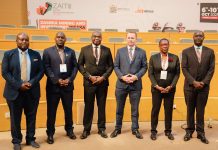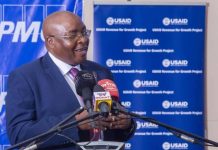The aftermath of the annual budget speech in Zambia is hardly the most thrilling of events; but this time around, at the annual KPMG-hosted budget debriefing in Lusaka at the Intercontinental Hotel, there was a distinct sense of something fresh in the air – and it wasn’t just because it had rained heavily during the night after weeks of intense heat.
“I’ve noticed a revolution,” said the moderator, opening the panel discussion. “The politicians spoke less than the private sector. That’s surely a step in the right direction!”
His words were only partly in jest, for it was clear there was a palpable shift in tone away from the days when the private sector was ritually regarded with suspicion, and the government was heavily involved in key areas of the economy.
“Government is not in the business of doing business,” Finance Minister Felix Mutati told the audience, repeating a key phrase made in his budget speech three days earlier. The government’s role was that of facilitator and regulator. The private sector can do things better. For example, on the role he hopes to see being played in improving the country’s railways, Mutati said: “The private sector will move the trains from 30 km/h once a day to perhaps 60 km/h twice a day.”
“We’ll take the tough decisions to clean up the balance sheet of Zambia”
State-owned enterprises (SOEs) were not contributing to the Treasury, and this created pressure on tax revenues. “Our parastatals are not paying dividends or tax,” Mutati said. The budget speech had been quite emphatic about what this means: “The IDC has been directed to conduct a situational analysis of all SOEs under its portfolio with a view to recapitalise those that have a good business case, and hiving off those that are not viable.” The key sectors include energy, telecoms, banking and savings, petroleum, railways and insurance.
Zesco, very much in the spotlight because of the energy shortage, came in for no special treatment. On the issue of cost-reflective tariffs, Mutati said there was no question of passing any inefficiencies on to consumers, and that Zesco’s cost structure would be openly and transparently debated.

The quest for growth would inform infrastructure spending too. Investment would go towards those areas that generate wealth and economic growth. The rest, he said, would be “panelbeated”, or simply stopped. It was a question of priorities.
The theme of private-sector involvement was reinforced by Trade, Commerce and Industry Minister, Margaret Mwanakatwe, who described the budget as being all about putting in place the necessary measures to produce economic growth in the future. “Yes, I’d like to see more than just 3% growth,” she said. “How we do it depends on the private sector, and how we facilitate their ability to deliver.”
She went on to question why government should be doing things like importing fuel and electricity, and subsidising it, when this could be done more efficiently by the private sector, with the market setting prices rather than government.
On the general issue of wealth creation, Mwanakatwe said: “We want to create millionaires.” She appealed to well-meaning businesses to make money, because government reaps the tax benefits. “When you make money, we make money.”
While clearly welcoming these pronouncements about the role of the private sector in Zambia’s future, the audience did not give government officials an easy ride.
Speaking from the floor, General Kingsley Chinkuli, country manager for First Quantum Minerals, said he hoped the government would “walk the talk” in implementing the proposed measures, because in the past there had often been “a loss of momentum”. He also said the recent reduction in Mineral Royalty Tax to 6% was a welcome measure, but that the worldwide average was 3%. And to Mwanakatwe, he said: “You want to see millionaires in Zambia. Good, but we must stop pursuing Zambians who are millionaires. Then we will see more Zambian millionaires.”
Another audience member questioned government’s commitment to controlling costs, and raised laughter when he referred to money wasted on “academic tourism”, which he described as workshops and conferences abroad.
Chamber of Mines president Nathan Chishimba welcomed government’s commitment to asking how it could reduce the cost of government. “That’s good,” he said. “We in the mining sector ask ourselves that question every day.”
Businessman and economist, John Kasanga, said he had no problem with cost-reflective tariffs. “But how efficient is Zesco? Or are we paying for Zesco’s inefficiencies? Their manpower costs are said to be around 60% of their revenue. It’s crazy.”
The moderator put Mutati on the spot by suggesting the bold new budget may well have been down to fear of the International Monetary Fund (IMF). “Did you have the IMF at the back of your mind?”
Mutati said he had already told the IMF and the World Bank six weeks ago in Washington that he was going to put a homegrown recovery plan in place. “Not because the IMF tells us to do it, but because we’re a responsible government. We’ll take the tough decisions to clean up the balance sheet of Zambia.”
However, he added that where he felt his capacity is limited, he would get the help he needs. “You can never walk alone,” he said.
The tough questions notwithstanding, it was clear that Mutati’s budget – and his vision of a new fiscally responsible Zambia committed to harnessing the power of the private sector to deliver growth – has found a receptive audience.
“For the first time, we have a Minister with whom we can sit down and discuss things,” said Chamber of Mines president, Chishimba.
The significance of this first budget of the new Finance Minister was underlined by Minister Mwanakatwe, when she said: “This is the year I believe will set the benchmark for the future.”
If government walks the talk and delivers on this ambitious and groundbreaking budget over the current term of office, President Lungu’s appointment of Felix Mutati as Finance Minister will prove to have been an inspired one.
See also: Mutati gives exclusive interview to Mining for Zambia


























